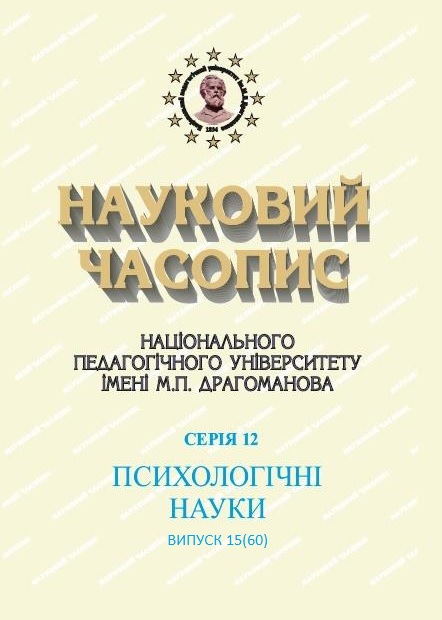PSYCHOLOGICAL ESSENCE OF THE CONCEPT OF EMOTIONALLY-SIGNIFICANT RELATIONSHIP
DOI:
https://doi.org/10.31392/NPU-nc.series12.2021.15(60).07Keywords:
interpersonal relationships, emotionality, communication, visual sympathy, intimacy, emotionally significant relationships.Abstract
The article presents the results of theoretical and empirical research of the content of emotionally significant relationship concept, analysis of the main provisions of modern psychological science to understand a particular phenomenon and outlines the components of this type of relationship. The results of the study were obtained using a questionnaire consisting of three semantic blocks. The first block of questions on “The idea of the phenomenon of emotionally significant relationships” revealed that the associations to our key concept are: love, affection, mutual understanding, respect, support, trust, loyalty, reciprocity and sincerity, this indicates that respondents see in emotionally significant relationships the best features that are inherent in interpersonal relationships. The second block of our survey concerned the psychological consistency and components of emotionally significant relationships. The most common answers were grouped into 5 categories and received the following scope of emotionally significant relationships in their hierarchy: care, reverence; similar value orientations, emotional response; sufficient level of communication; openness, trust; respect and understanding. The third block of questions concerned the destructive tendencies and factors that determine the dynamics of emotionally significant relationships. It was found that they can be emotionally exhausting because they contain a number of attributes that destabilize the relationship between partners. However, a third of respondents deliberately deny this possibility, and half allow it only in some cases. This suggests that the basis of perceptions of the latter are feelings with a positive modality. In case of destruction, they must bear another name. So, emotionally significant relationships are close relationships, usually between the partners who have the ability to embody an emotional and value attitude and evoke feelings in a partner through the prism of their life experience.
References
- Ananev, B.G. (2008). Lichnost, subekt dejatelnosti, individualnost [Personality, subject of activity, individuality]. Moscow : Direkt-Media [in Russian].
- Bogomolova, N.N., Bodalev, A.A., & Gitelmaher, R.B. (2005). Osnovy socialno-psihologicheskoj teorii. (uchebnoe posobie). [Foundations of socio-psychological theory. Tutorial]. Moscow : Izd-vo Mezhdunar. ped. Akademii [in Russian].
- Berezovska, L., & Yamchuk, T. (2020). Psykholohiia mizhosobystisnykh vzaiemyn podruzhnoi pary [Psychology of міжособистісних mutual relations of the married couple.]. Visnyk Natsionalnoho universytetu oborony Ukrainy, 56(3), 5–13. https://doi.org/10.33099/2617-6858-2020-56-3-5-13 [in Ukrainian].
- Bern, E. (2016). Іgri, u jakі grajut ljudi [Games peolple play]. Kharkіv: Knizhkovij klub “Klub sіmejnogo dozvіllja” [in Ukrainian].
- Bodalev, A.A. (2007). Formiravanie ponjatija o drugom cheloveke kak lichnosti [Forming of concept about other man as personality]. Izdatelstvo Leningradskogo univesiteta [in Russian].
- Bodalev, A.A. (2004). O vzaimosvjazi obshhenija i otnoshenija [About intercommunication of communication and relation]. Voprosy psihologii, 1, 122–127 [in Russian].
- Brytannyka, I.E. (2007). Encyclopædia britannica. Brytanskaia entsyklopedyia, Incorporated. https://en.wikisource.org/wiki/Index:EB1911_-_Volume_29.djvu [in Russian].
- Viliam, Dzh. (2011). Psykholohiia [Psychology].Moscow : Pedahohika [in Russian].
- Hirniak, A.N., & Hlova, I.M. (2019). Peredumovy formuvannia harmoniinoi mizhosobystisnoi vzaiemodii v molodii simi [Pre-conditions of forming of harmonious міжособистісної cooperation are in young family]. IV Mizhnarodna naukovo-praktychna konferentsiia «Ukraina v umovakh reformuvannia pravovoi systemy: suchasni realii ta mizhnarodnyi dosvid»
(m. Ternopil, 5–6 kvitnia 2019.), T. 2. (pp. 133–135). Ternopil : Ekonomichna dumka. Retrieved from http://uf.wunu.edu.ua/wp-content/uploads/2020/03/TEZI-YUF-2019-T.-2.pdf#page=133 [in Ukrainian]. - Gozman, L.Ja., & Azhgihina, N.I. (2008). Psihologija simpatij [Psychology of liking]. Moscow : Znanie, 1(5) [in Russian].
- Grej, Dzh. (2017). Muzhchiny s Marsa, zhenshhiny s Venery [Men from Mars, women from Venus]. Grej. K.: Sofija [in Russian].
- Zhuravlova, L.P., & Kolomiiets, T.V. (2013). Strukturno-dynamichna model mezovymiru mizhosobystisnoi vzaiemodii [Structural-dynamic model of mesodimension of interpersonal interaction]. Osvita rehionu, 4(34), 275–279 [in Ukrainian].
- Zhmailo, I.M. (2013). Mizhosobystisni vzaiemyny yak sotsialno-psykholohichna problema.[Interpersonal relationships as a socio-psychological problem]. Problemy suchasnoi psykholohii, 22, 146–154 [in Ukrainian].
- Zinchenko, V. P., & Morgunov, E. B. (2004). Chelovek razvivajushhijsja. Ocherki rossijskoj psihologii [Man developing. Essays on Russian psychology]. Moscow : Trivola [in Russian].
- Izard, K.E. (2009). Jemocii cheloveka.(per. s angl.)[Human emotions]. In Ja. Gozman,
& M.S. Egorova (Eds.). Moscow : Izd-vo MGU [in Russian]. - Kolomiiets, N. (2018). Teoretychnyi analiz poniattia vzaiemodiia [Theoretical analysis of the concept of interaction] .Psykholoho-pedahohichni problemy silskoi shkoly, 58, 112–119. Retrieved from http://library.udpu.org.ua/library_files/psuh_pedagog_probl_silsk_shkolu/58/
pdf [in Ukrainian]. - Kolomynskyi, Ya. L. (2003). Sotsialna psykholohiia shkilnoho klasu: nauk-metod. posibnyk dlia pedahohiv ta psykholohiv [Social psychology of school class: science-method. manual for teachers and psychologists]. Mynsk : OOO “FUA inform” [in Ukrainian].
- Kronik A.A., & Kronik, E.A. (2010). V glavnyh roljah: vy, my, on, ty, ja.[Starring: you, we, he, you, me]. : Mysl. [in Russian]
- Lomov, B.F. (2013). Metodologicheskie i teoreticheskie problemy psihologii. [Methodological and theoretical problems of psychology].Directmedia [in Russian]
- Miasyshchev, V.N. (2015). Psykholohyia otnoshenyi [Psychology of relationships].Voronezh : Moscow [in Russian].
- Rubynshtein, S.L. (2016). Bitye y soznanye [Being and consciousness]. Pyter [in Russian].
- Orban-Lembrik, L.E. (2013). Sotsialna psykholohiia [Social Psychology]. Kyiv : Akademvydav [in Ukrainian].
- Obozov, N.N. (2010). Vozrastnaja psihologija: junost i zrelost [Age psychology: youth and maturity]. Saint Petersburg : SaiVeda [in Russian].
- Shadskykh, Yu.H., & Picha, V.M. (2006). Psykholohiia: Korotkyi navchalnyi slovnyk: terminy i poniattia.[Psychology: A short educational dictionary: terms and concepts]. Lviv : “Mahnoliia” [in Ukrainian].
- Shnejder, L.B. (2009). Psihologija semejnyh otnoshenij [Psychology of family relations.]. Aprel-Press, JeKSMO-Press [in Russian].
- Fromm E. (2003). The Art of Loving: A Study of the Nature of Love. New York : Harper and Brothers.
- Mead, G.H. (2004). The philosophy of the present. Amherst : Prometheus Books.
- Sullivan, H. (2002). The Psychiatric Interview (Norton Library). New York : WW Norton & Co
- Plutshik, R., 2006. Psycholophysiology of individual differences with special reference to emotions. Annual New York : Acad Sciense.

